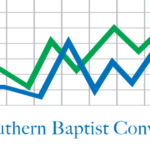WASHINGTON (RNS)—The recession was a double-barrel blow to American congregations—directly hurting their budgets while also stretching them thin due to increased needs for counseling, emergency housing and other social services.
But the worst seems to be over, according to a recently released report that found one in 10 have begun to recover from the loss, and more than 40 percent now are stable or increasing financially.
The “Holy Toll” report, based on the 2010 Faith Communities Today national survey of more than 20 religious groups, found more than half (57 percent) of U.S. congregations reported their income had declined due to the recession.
|
While the worst appears to be over in terms of the recession and its impact on American churches, more than half of congregations in the United States report their income declined. (RNS FILE PHOTO/Paul S. Howell )
|
Researcher David A. Roozen, director of the Hartford Institute for Religion Research, said larger congregations seem to be recovering more easily as endowments and investment income rebound, and more members who can help them grow their way out of deficits.
His theory echoes the recent State of the Plate report by the Evangelical Council for Financial Accountability and Christianity Today International’s church management team, which found smaller churches had suffered a disproportionate drop in giving last year.
Roozen’s survey, based on data from more than 11,000 congregations, found the recession had hurt congregations across the spectrum, surprising researchers who “almost always find differences” between evangelical and mainline Protestant churches.
Nine percent of congregations said the recession had prompted layoffs or furloughs, and just over a quarter of congregations reported salary freezes or reductions.
With about 350,000 congregations in the United States employing about 1.5 million clergy and other staff, that translates to more than 500,000 people who lost jobs or had their salaries reduced, and about 50,000 prospective employees who weren’t hired, according to the report.
At the same time, congregations had to ramp up outreach services due to the recession’s toll on local communities. Nearly half of all congregations experienced an increase in requests for cash assistance, and nearly one in four received moderate to major increases in requests for emergency housing.
Sign up for our weekly edition and get all our headlines in your inbox on Thursdays
“Those congregations whose finances were hit the hardest, a lot of their members were unemployed, so you had members who were financially stressed, you had communities who were financially stressed, on top of the fact that the congregations’ own financial re-sources as measured by income was down,” Roozen said.
But even congregations that have recovered from the recession still are struggling with a general economic downturn for America’s religious organizations. From 2000 to 2008—before the recession’s toll—congregations reporting “ex-cellent financial health” had dropped from 31 percent to 19 percent; the number is now about 14 percent.
Meanwhile, congregations re-porting financial difficulty more than doubled, to nearly 20 percent, in the past decade.
“That the worst is over doesn’t necessarily mean that things are getting better,” Roozen explained, estimating that at least 5 percent of congregations won’t be able to rebound.
“These are challenging times. Most congregations aren’t feeling devastated by the recession (anymore), but it’s exacerbating those downward trends. … It’s not something that congregations move easily out of.”














We seek to connect God’s story and God’s people around the world. To learn more about God’s story, click here.
Send comments and feedback to Eric Black, our editor. For comments to be published, please specify “letter to the editor.” Maximum length for publication is 300 words.